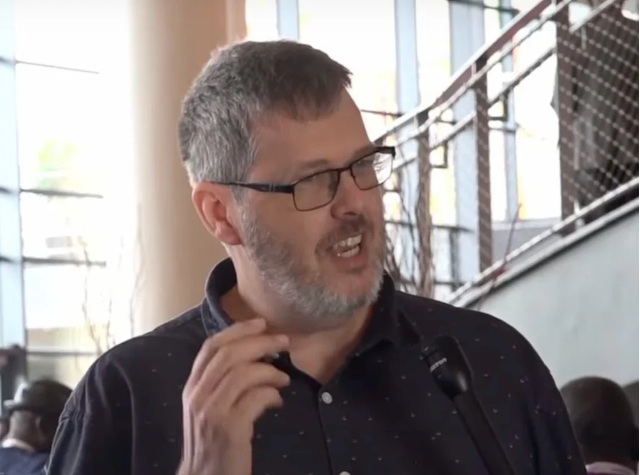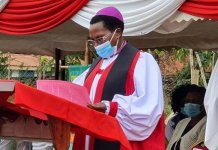My big story started in 2013. I was in Nairobi at Gafcon, and Mike Ovey [the late principal of London’s Oak Hull College] Mike spoke on Ephesians chapter five.
[The passage says] that there were those who would deceive us into thinking that the wrath of God is not coming because of, as Paul puts these things, the extent of their immorality. And the encouragement of the Apostle Paul, “Do not become partners with them”.
And that started me thinking, well, here I am in the Brisbane diocese; what does it mean to be partners? What does that mean in terms of my relationship with the diocese?
It’s not a simple question. That’s why I took so long to work it through. It actually isn’t a simple question, as so many people who are committed to the cause of the gospel and the authority of the Scriptures show because they remain in structures like that.
It came to a head for me when last year, the Archbishop [Phillip Aspinall], in his address, said that the ethical commands of scripture are no longer prescriptive*. That statement rang out as a break with Anglican theology, with Christian theology that I did not feel I could remain.
My point of contention with the Archbishop actually wasn’t around the same-sex marriage issue. Because actually, as we often discussed, that is a presenting issue of the much deeper issue of discarding the authority of Scripture.
And when he openly rejected that authority, that was something that was quite unusual. The Archbishop tended not to play his cards; he would let other people do his talking for him. He didn’t tend to say anything that could come back to bite him. It was quite unusual for him to make such a stark statement.
But, I then challenged the Archbishop.
I left Synod [the church parliament, where Aspinall gave the Archbishop’s address]. I wrote to him and said I’d left Synod and would like to talk with him about it. We met; we had a very lengthy, gracious, lengthy conversation in which he stood by his assertion that the ethical command prescription* no longer applies. He said, we’ve moved on in our world, and the world of the scriptures is too different a world, and we need to modify it. And those commands can no longer apply.
For me, that just meant I could no longer continue e in submitting to the authority of the Archbishop to whom I was licensed. So I left the Anglican Church of Southern Queensland. And in leaving, that left us quite adrift.
It tore a good church. Half a church remains at St John’s Wishart [the parish Judge-Mears was the minister of], and it’s a good church. And there’s half a church, who left St. John’s Wishart, [to become Southern Cross Anglican Church, Southside]. I guess they’re now two full churches.
But, it has left the pain of that decision.
It hasn’t just been a pain that I had to wear. It’s a pain that a lot of people have had to wear. And that’s been difficult.
This is one of the reasons why the Diocese of the Southern Cross was such a help. In 2020, we heard the announcement of the Diocese of the Southern Cross as an idea. Is that the best way to put it? Commitment. It was a commitment to do it. Yeah. To do it if needed. It was an “in case of emergency, break glass” strategy.
And there was a sense in which when we hit that Synod in 2022 and reached out for what had been described as a lifeboat diocese, we found that the lifeboat was still under construction, and we were kind of handed a hammer and nails and told to join in.
But that’s been part of that pleasure for us. But our story isn’t unique. Our story is a story that has been repeated in many dioceses in Australia. It’s a story that had been worked out in the United States with the creation of the Anglican Church of North America. It’s a story that’s been worked out in Brazil. It’s been worked out in Europe. It’s been worked out in New Zealand as people have felt that the stance that the Anglican Church has taken, particularly a diocese or, in some cases, the whole province has taken, has so varied from received Anglican theology that it’s no longer recognisably Anglican.
For me, the lifeboat role of the Diocese of Southern Cross was critical, Also for Peter Palmer [in Beenleigh and Logan], for Trevor Saggers [in Cairns], for Linley Matthews-Want over in Bunbury, all coming out of those Anglican dioceses because we could no longer stand with them. So there’s a role of the Diocese of Southern Cross actually to recover those congregations, people who want to remain faithful and uphold the place of the scripture that the Anglican Church has always honoured. It’s the second paragraph in our Anglican Constitution in Australia, isn’t it? There it is that the scriptures are paramount.
And yet, there seems to be this drifting away, not just drifting away, but an active rejection.
And so recovering people who can’t stay in there anymore has played an important role. We found that at Southside, this new church that we’ve established under the diocese, we have a number of people who weren’t from St. John’s. In fact, a third of our congregation never went to St. Johns Wishhart. They’d come to us because they hadn’t had a whole church which they felt uncomfortable with. It felt too uncomfortable to stay. And so they’ve joined with us.
One of the important things that the Diocese of the Southern Cross does, and one of the reasons it’s so important, is that we’re setting out to recover theology.
I was 14 years in the Anglican Church of Southern Queensland. And in that time, I’ve heard denials from senior leadership of the issues of biblical gender sexuality and the open rejection of the creeds. Both in radio interviews and in print publications, calling for discarding the creeds and rejecting the 39 Articles.
One friend of mine was told in front of the class that if she upheld the 39 Articles, then her God was a different God from the lecturer’s God, and her God was a monster. This is in an Anglican theological college.
The rejection of the scriptures: well, we’ve heard about that in terms of the quote from the archbishop, the rejection of the virgin birth, the rejection of the bodily resurrection of Jesus. All of this stuff was acceptable in our diocese. In the Anglican Church of Southern Queensland, those were acceptable deviations. That is an astounding thing when we have a constitution that says they’re not [acceptable deviations].
Clarification, readers told me “prescription” was the word used. Linley Matthews-Want name corrected










